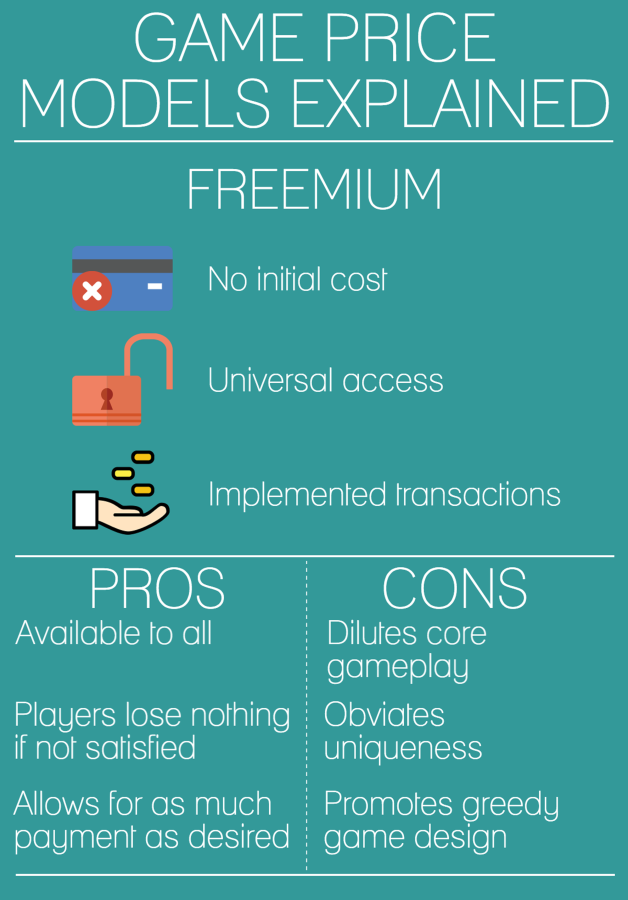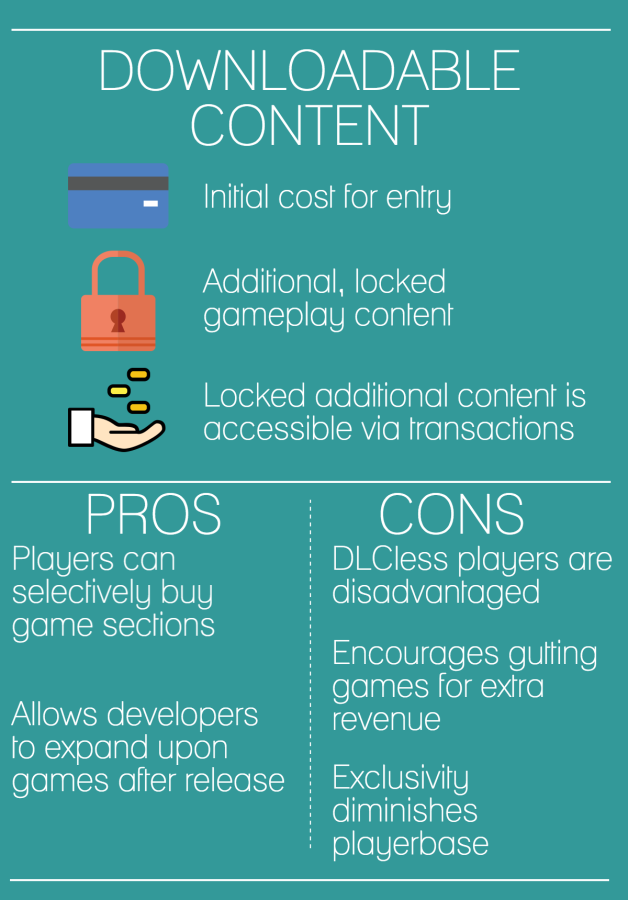Freemium gaming diminishes the video game market
The freemium model allows players to obtain advantages by using real money to buy forms of internal currency to get more moves in Candy Crush, fill the stamina bar in Madden Mobile and speed up build times in Clash of Clans, to name a few examples.
December 2, 2015
The advent of the internet has inexorably changed the nature of digital purchases – perhaps for the worse when considering the video game market. Increasingly publishers have adopted a business model colloquially known as “freemium gaming.”
As the name suggests, the freemium model revolves around a juxtaposition of “free” and “premium.” Players can play these games for free, but have the option of paying fees to gain various advantages. These premiums are often meager sums, but nevertheless grant tangible benefits.
Since anyone can pick up a freemium game and start playing at no up-front cost, players initially favor this game model. After all, not many of us know an older relative who is a dedicated gamer. But almost all of us have an aunt or uncle playing smartphone games.
Currently, 24 of the 25 iPhone games that have earned the most revenue are free to download but support in-app purchases. A similar situation is seen on the Google Play store: all 25 of the market’s top grossing games employ the freemium model.
Users no longer enjoy an equal playing field: the more they can open their wallet, the greater advantage they gain.
The end result? Low-quality, free games saturate the market, and there is an overwhelming lack of diversity. A few repetitive archetypes arise: the first-person shooter, the city-building simulation, the business-management simulation. Almost every freemium game is a recreated older game open to implement user purchases.
Candy Crush serves as a typical example of this effect. Everyone who has played the 2001 classic computer game Bejeweled realizes that Candy Crush is merely a sugary derivation. This new version allows for monetary transactions, though. Players can pass levels by opting to pay real money to gain extra moves, lives, and power-ups.
This simple addition of currency damages the game. While people would compete with their friends in Bejeweled and gain the highest score through sheer skill, Candy Crush’s freemium nature precludes meaningful competition, as players can pass levels using money rather than natural skill. Users no longer enjoy an equal playing field: the more they can open their wallet, the greater advantage they gain.
If it is possible to gain an advantage in ways other than natural prowess or practice, competition becomes meaningless. If the freemium model was applied to any other medium, the results would be ridiculous. Basketball teams paying the NBA for extra free throws? A debater bribing the judge for more speech time? Dealers handing out extra cards for $19.99? Competition would be destroyed overnight. Games would no longer be fun to play.
As long as gamers continue to play freemium games and support the price model, the overall quality and playability of video games will only continue to deteriorate.



















![“[Building nerf blasters] became this outlet of creativity for me that hasn't been matched by anything else. The process [of] making a build complete to your desire is such a painstakingly difficult process, but I've had to learn from [the skills needed from] soldering to proper painting. There's so many different options for everything, if you think about it, it exists. The best part is [that] if it doesn't exist, you can build it yourself," Ishaan Parate said.](https://harkeraquila.com/wp-content/uploads/2022/08/DSC_8149-900x604.jpg)




![“When I came into high school, I was ready to be a follower. But DECA was a game changer for me. It helped me overcome my fear of public speaking, and it's played such a major role in who I've become today. To be able to successfully lead a chapter of 150 students, an officer team and be one of the upperclassmen I once really admired is something I'm [really] proud of,” Anvitha Tummala ('21) said.](https://harkeraquila.com/wp-content/uploads/2021/07/Screen-Shot-2021-07-25-at-9.50.05-AM-900x594.png)







![“I think getting up in the morning and having a sense of purpose [is exciting]. I think without a certain amount of drive, life is kind of obsolete and mundane, and I think having that every single day is what makes each day unique and kind of makes life exciting,” Neymika Jain (12) said.](https://harkeraquila.com/wp-content/uploads/2017/06/Screen-Shot-2017-06-03-at-4.54.16-PM.png)








![“My slogan is ‘slow feet, don’t eat, and I’m hungry.’ You need to run fast to get where you are–you aren't going to get those championships if you aren't fast,” Angel Cervantes (12) said. “I want to do well in school on my tests and in track and win championships for my team. I live by that, [and] I can do that anywhere: in the classroom or on the field.”](https://harkeraquila.com/wp-content/uploads/2018/06/DSC5146-900x601.jpg)
![“[Volleyball has] taught me how to fall correctly, and another thing it taught is that you don’t have to be the best at something to be good at it. If you just hit the ball in a smart way, then it still scores points and you’re good at it. You could be a background player and still make a much bigger impact on the team than you would think,” Anya Gert (’20) said.](https://harkeraquila.com/wp-content/uploads/2020/06/AnnaGert_JinTuan_HoHPhotoEdited-600x900.jpeg)

![“I'm not nearly there yet, but [my confidence has] definitely been getting better since I was pretty shy and timid coming into Harker my freshman year. I know that there's a lot of people that are really confident in what they do, and I really admire them. Everyone's so driven and that has really pushed me to kind of try to find my own place in high school and be more confident,” Alyssa Huang (’20) said.](https://harkeraquila.com/wp-content/uploads/2020/06/AlyssaHuang_EmilyChen_HoHPhoto-900x749.jpeg)








Maren • Mar 29, 2018 at 2:36 am
All the complaints that you have about freemium not providing a level playing field is depending on how the Premium is structure.
All the complaints you have could also apply to a Paid game if it is not structure correctly. The base game is US$20, the plus version US$25 gives you more DLC. The end results is that you have the same problem.
I think your issue is not with Fremium but price structuring.
Misogi • Aug 8, 2018 at 2:47 am
1. Base games are not $20 unless they are incredibly old.
2. Nobody is spending an extra $25 on dlc that is more expensive than the basic release version of an old game.
3. Almost all non-freemium competitive online games with dlc expansions/updated versions are not mandatory or required to play. They’re also typically incompatible with eachother BECAUSE they would create glaringly unfair balance issues within a shared community.
4. Pay to win is exactly what it means, and are bad games.
It’d be like going to a sporting event where it’s legal for players to pay off the ref.
It’s not price structuring.